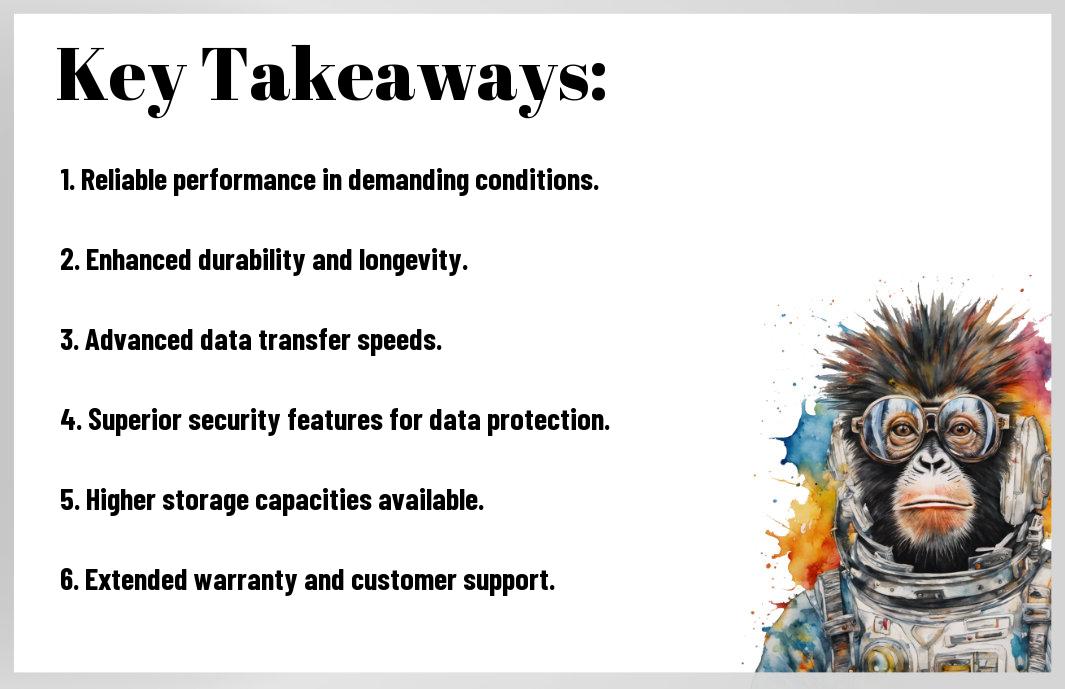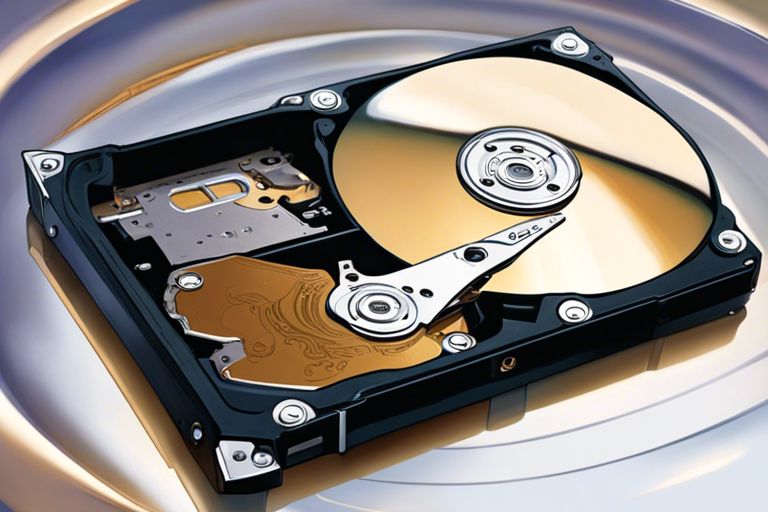Just when you thought all hard drives were created equal, think again! A high-quality hard drive stands out from standard options in performance, reliability, and durability. It’s not just about storing your data; it’s about ensuring that your files are safe and accessible whenever you need them. Investing in a top-notch hard drive can mean the difference between smooth sailing and a data disaster. Let’s investigate the key factors that differentiate a high-quality hard drive from the rest.
Key Takeaways:
- Reliability: High-quality hard drives are built to last and have lower failure rates compared to standard options.
- Performance: High-quality hard drives offer faster read/write speeds and better overall performance, making them ideal for demanding tasks.
- Durability: These hard drives are designed to withstand more wear and tear, ensuring they can handle heavy usage without failing.
- Data Security: High-quality hard drives often come with built-in security features like encryption, minimizing the risk of data breaches or loss.
- Warranty and Support: Manufacturers of high-quality hard drives usually offer better warranty coverage and customer support, providing peace of mind for users.
What’s Under the Hood: The Anatomy of a Beast
Capacity isn’t Just a Number
One of the key factors that set apart a high-quality hard drive from standard options is the capacity. It isn’t just about the number of gigabytes or terabytes the drive can hold; it’s about the reliability and efficiency of storing and retrieving data. A high-quality hard drive not only offers ample storage space but also ensures that your data is safe and accessible whenever you need it.
Spinning Right: RPM and What it Means for Performance
With spinning right refers to the revolutions per minute (RPM) of the hard drive platter. A higher RPM means faster data access times and better overall performance. High-quality hard drives often come with 7200 RPM or even 10000 RPM, providing lightning-fast speeds for your computing needs.
Understand that the RPM of a hard drive directly impacts its performance, especially in tasks that require quick data access, such as gaming or video editing. Investing in a hard drive with a higher RPM can make a significant difference in the speed and efficiency of your system, ensuring a smoother user experience and faster workflow.

Durability and Longevity: Why It’s Worth the Investment
Built Tough: The Materials that Matter
If you’re looking for a high-quality hard drive that can withstand the test of time, pay close attention to the materials it’s made of. Durable materials like aluminum or magnesium alloys can make a significant difference in the overall durability of your hard drive. Investing in a hard drive constructed with top-notch materials may cost a bit more upfront, but it can save you from the headache of having to replace your drive frequently due to wear and tear.
Keeping it Cool: The Importance of Thermal Management
Cooling is key when it comes to maintaining the longevity of your hard drive. Proper thermal management can prevent overheating, which is one of the biggest culprits behind hard drive failures. Look for drives that come equipped with efficient cooling systems or consider adding extra cooling solutions to your setup. Trust me, a few extra bucks spent on keeping your hard drive cool is worth every penny when it comes to protecting your important data.
To ensure your hard drive lasts as long as possible, regularly clean the dust and debris that can accumulate around your drive and its cooling system. Dust buildup can hinder airflow and lead to overheating, so a quick cleaning every now and then can go a long way in preserving the health of your hard drive. Keep in mind, a little maintenance goes a long way in extending the life of your valuable data storage solution.
Speed Demons: The Need for Fast Data Transfer
Interface Magic: SATA vs. NVMe
Fast data transfer is necessary for anyone dealing with large files and demanding applications. Regarding hard drives, the interface plays a crucial role in determining how quickly data can be accessed and transferred. SATA (Serial Advanced Technology Attachment) has been a staple in the industry for years, offering decent speeds and compatibility with most systems. On the other hand, NVMe (Non-Volatile Memory Express) technology takes speed to a whole new level, leveraging the PCIe interface for blazing-fast performance. Choosing the right interface can make a significant impact on your workflow and productivity.
Cache is King: Understanding Memory on a Hard Drive
Hard drives often come equipped with a cache memory that acts as a temporary storage buffer between the drive and the system. Understanding cache memory is crucial as it can greatly influence the overall performance of the hard drive. Larger cache sizes can help speed up data access times and improve overall system responsiveness. When shopping for a high-quality hard drive, pay attention to the cache size to ensure you’re getting the best possible performance for your needs.
Smart Features That Make a Difference
Error Checking: Avoiding Data Disasters
Not all hard drives are created equal, my friends. In the context of safeguarding your precious data, error checking is a game-changer. Picture this – you’re working on an important project, and suddenly, your computer crashes. Without error checking, you could be looking at a data disaster. High-quality hard drives come equipped with advanced error checking mechanisms that constantly monitor your data for any discrepancies and correct them before it’s too late. It’s like having a superhero safeguarding your data, ensuring its integrity at all times. Don’t settle for mediocrity when your data’s at stake!
Firmware and Optimization: The Brain Behind the Brawn
On the surface, all hard drives may look the same, but it’s what’s under the hood that truly sets them apart. The firmware and optimization of a high-quality hard drive are like the brain behind the brawn. This dynamic duo works tirelessly to ensure your hard drive operates at peak performance, maximizing speed, efficiency, and longevity. It’s not just about having storage space; it’s about having smart storage space that adapts and evolves to meet your needs. The next time you’re shopping for a hard drive, remember – it’s not just about what you see, but what you don’t see that makes all the difference.
FAQ
Q: Why should I invest in a high-quality hard drive instead of a standard option?
A: Investing in a high-quality hard drive ensures greater reliability, durability, and performance, providing superior protection for your valuable data and peace of mind.
Q: What features distinguish a high-quality hard drive from standard options?
A: High-quality hard drives typically offer faster data transfer speeds, enhanced security features, longer warranties, and better build quality compared to standard options.
Q: How does a high-quality hard drive contribute to data security?
A: High-quality hard drives often come equipped with advanced encryption technologies and robust backup solutions that help safeguard your data against unauthorized access and potential loss.
Q: Can a high-quality hard drive improve the overall performance of my system?
A: Yes, a high-quality hard drive with faster read/write speeds and efficient caching mechanisms can significantly improve the overall performance of your system, enabling quicker access to data and smoother operation of applications.
Q: Is it worth paying more for a high-quality hard drive over a standard option?
A: While high-quality hard drives may come at a higher price point, the benefits they offer in terms of reliability, performance, and data security make them a worthwhile investment for individuals and businesses looking to protect and enhance their digital assets.




![Xbox Game Pass Ultimate – 1 Month Membership – Xbox Series X|S, Xbox One, Windows [Digital Code]](https://m.media-amazon.com/images/I/41ST5TzlE-L._SY430_SX215_QL70_ML2_.jpg)